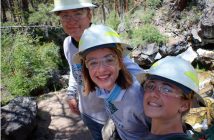With temperatures hovering in the 90s and predictions of 100 degree weather for at least two full weeks in June we just may be staring at climate change right in the eye…all over Oregon a heat wave has broken several June records. Furthermore, the extreme heat is likely to last well into early July and may end up breaking records for longevity as well.
From Burns to Bend and Eugene to Portland numerous communities are facing intense heat waves. The Climate Prediction Center’s 90-day long-range forecast calls for below-average precipitation for western and Central Oregon with above-average temperatures lasting through July.
In April Governor Kate Brown declared a drought emergency in Central Oregon as the region faced record low snowpack levels. At the time the announcement was made it was raining here and it seemed little notice was taken by the general public as to a drought. Now, with these temperatures we recognize the heightening wildfire risk threatening wildlife and agriculture and the snow pack levels we’ve come to rely on as significantly low.
Should we be alarmed? “We need to have some really tough conversations about our future and water supply,” says Oregon Climate Change Research Institute Associate Director Kathie Dello.
In a piece in The Oregonian on the 2014-15 Oregon drought, Dello points out that although it’s impossible to peg an isolated event such as drought to the long-term shifts anticipated with climate change, “this looks a lot like our future climate models.” (March 31, 2015)
Why should we care? An increase in global temperatures could lead to long term changes close to home. With climate change, Oregon could experience problems with rain and snow patterns, diminished water supplies and crop productivity, forest fires, heat-related illnesses and deaths and warmer streams and rivers would harm salmon and other native species and non-native species could replace them.
Some scientific models show Oregon average temperatures could increase by five degrees in winter and five degrees in summer. Insects carrying tropical diseases such as malaria and dengue fever could spread into a warmer Oregon.
Sounds awful doesn’t it? And a little alarmist. However, changing how we use energy is a good way to help preserve the natural places that have long made Central Oregon unique.
Here’s what you can do:
Save Energy: “Changing our energy practices should be one of our highest priorities. If we care about the world that we will leave for our children and our grandchildren, we will change our energy practices — and do it soon,” says Dr. Jane Lubchenco Oregon State University Distinguished Professor of Zoology.
Enter the Bend Energy Challenge. This high profile community competition has the potential to drive the City towards a more sustainable future. Check out the website www.Bendenergychallenge.org and take the Pledge to reduce your energy use and help Bend win a $5 million prize. Once you sign up, the online energy tool will provide tips and resources to help you get started and can track your progress.
It is especially important for businesses to take the Business Pledge to show support for our community’s involvement in the competition and access the Top 10 Actions list and Resources page to find relevant information to begin lowering utility costs.
In order for Bend to win the $5 million our community must participate. We will be judged on how many people take this seriously. The $5 million will provide many opportunities such as creating a revolving loan fund for moderate income families to use clean, efficient energy, establishing an energy innovation fund that invests in energy innovation by local businesses and investments in iconic local projects that will measurably reduce our energy use.
The Energy Trust of Oregon offers free Energy Saver Kits for Pacific Power or Cascade Natural Gas customers, www.energytrust.org/esaverkits. Simple free and low-cost ways abound to lower the amount of energy we are wasting on a daily basis.
On the Energy Trust website developers, architects and builders are finding ways to manage energy use in existing space or design efficiency into new construction projects with technical assistance and cash incentives from Energy Trust of Oregon. Whether you’re a commercial business owner, design and construction professional or multifamily property manager, you can find opportunities for energy savings.
Path to Net Zero incentives and resources support new commercial construction that exceeds Oregon building code standards. A new offer from Energy Trust of Oregon is helping Oregon building owners design and construct some of the most energy-efficient new commercial buildings in the nation. Iron Horse Lodge in Prineville is an example of a local company using Path to Net Zero.
Solar is a viable and accessible option in Central Oregon. For instance, in compliance with the 1.5 percent Green Technology in Public Buildings mandate set forth by the state in 2007, Warm Springs K-8 Elementary purchased a solar system on their school. Installed by Sunlight Solar Energy of Bend the solar system is expected to save the school $4,000.
Why conserve water?
Flows in the headwaters of Tumalo Creek will be severely reduced in the coming decades, according to a new study that indicates by the year 2039, the average June baseflow for Tumalo Creek will decline by 61 percent compared to a 2008 baseline. That’s a lot! The study, Climate Change Impacts on Stream Flows, Upper Deschutes Basin, suggests that a warming climate will impact groundwater discharge to streams, decreasing the flows that currently contribute to Bend’s water supply.
The study was commissioned by Central Oregon LandWatch (COLW) and executive director, Paul Dewey offers this advice: “It is imperative that we make the right decisions today to make sure there is an adequate water supply in the future. ”
He’s so correct. Regardless of your view that the weather patterns are changing due to Mother Nature or manmade impact, as business owners/operators we should participate in these decisions and it all starts at your office using conservation and sustainability as a mantra.





